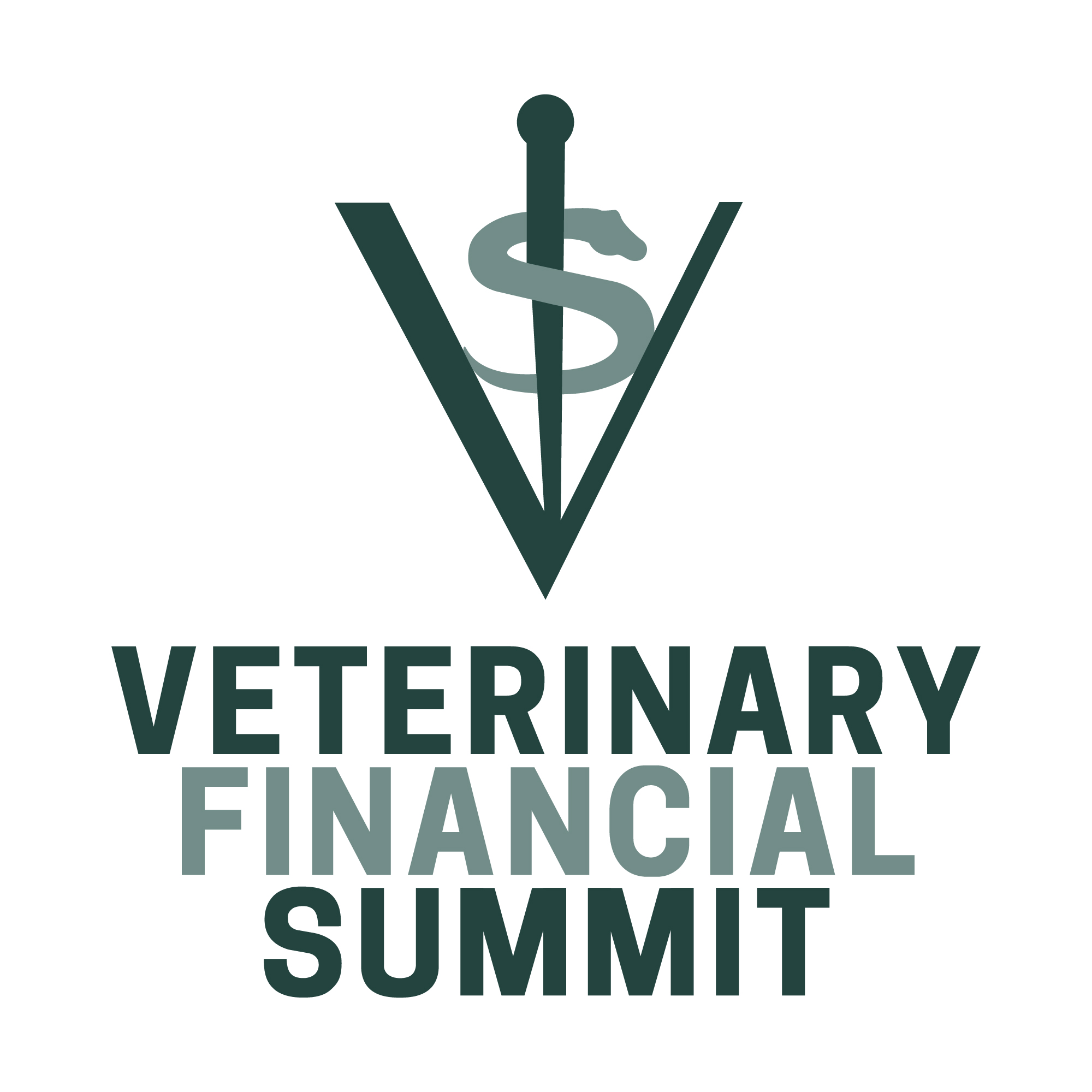When is the best time to implement great financial recommendations?
When you were young.
When is the next best time to implement brilliant financial suggestions?
As soon as you become aware of them!
To help you do just that, I asked several Veterinary Financial Summit speakers what financial advice they would give to their younger selves… or you.
Here are their best suggestions.

SAVINGS
It all starts with saving more. Terry O’Neil, CPA, CVA, and partner at Katz, Sapper & Miller in Indianapolis, IN, insists: “You are never too young to save. Do not wait to have a vision of your end game. Start now.”
Darby Affeldt, DVM, RICP® and associate partner at North Star Resource Group in Olympia, WA, confirms: “Save first, spend less, and consider that your goal is to do your very best to mitigate any future financial regret by being very deliberate with how you spend your money now. Saving is not deprivation. Saving is simply delaying spending!”
Tim McFillin, CLTC, financial advisor, founder, and president of Medical Advisors Group in Vienna, VA, explains how to gently “force” yourself to save: “As a spender myself, I would start monthly auto-drafts into savings and investment accounts – in addition to 10% into my 401(k). You cannot spend money that never makes it to your bank account. So take it out of your reach automatically. Do not take funds from those accounts unless there is a true emergency and you literally have no other option. If you automate your finances, you can be confident that you will be on the right financial track later on.”
Lora Hoff, CFP, CPWA at IPI Wealth Management in Dallas, TX, agrees: “Saving a little bit is the same as spending a little less on the bottom line. Doing both is even better! Living within your means is just as important once you start making more money. Never get comfortable that you have enough savings. I like to create new savings vehicles to fill up again so I am always motivated.”

CREDIT AND INTEREST
Dr. Dave Nicol, practice owner, author, speaker, and coach in the UK, believes that “it is critical to get your head around just exactly how powerful compound interest is!”
Dr. Jonathan Leicht, veterinarian and CEO/President of Mosaic Veterinary Partners, warns: “When you need credit, assume the person across the table knows more than you. Act accordingly to protect yourself and make the right decision for yourself.”
Lora Hoff agrees: “Never be fooled by the monthly cost of something without understanding the total cost. For example, to understand your real monthly car payment, you need to add up the interest rate and all of the hidden fees.”

INVESTING
Of course, saving is just the beginning. The next step is to invest your money wisely.
Dave Nicol encourages you to “save more in your 401k. Markets rise and fall. Don’t be spooked by normal fluctuations. Stick with it for the long term.”
Jonathan Leicht confirms: “Start saving and investing as soon as possible. Compounded returns add up when you have a 50-year time horizon.”
And for contrarian advice, Dr. Michael Bugg, veterinarian turned real estate investor at YXE Real Estate Group in Saskatoon, Saskatchewan, explains that there is a time and place for diversification: “Diversification is dilution. Growth and expansion come from focus. When you are starting out and you are in the growth phase, you need to focus! Become an expert. Continually get better in your area of focus. The ability to exponentially increase your earning power will move the financial needle far more than skipping your morning “expensive” coffee ever will. There will come a time when diversification makes sense, but it’s not when you get started.”

PRACTICE OWNERSHIP
Investing goes beyond the stock market, insists Isaiah Douglass, MBA, CFP®, CEPA, and Account Executive at Swan Bitcoin. “Saving will never get you to your goals. You must invest in yourself through a business or assets.”
Buying or starting a practice is a good start. Do it with the end in mind, recommends Collin Hart, MBA, co-founder, CEO, and managing director at ERE Healthcare Real Estate: “You should enter all investments with an exit strategy in mind. Most of our clients don’t think about selling the real estate portion of their practice until they’re ready to retire. Yet a successful real estate sale takes preparation, sometimes years. Don’t neglect this critical step.”
In addition, Collin Hart recommends investing in what you know, rather than getting lured by shiny objects (crypto anybody?).
“Stay in your lane. Focus on investing in your practice. Grow it. Improve your practice real estate to support your practice. And you will fare much better when you decide to sell.”

LIVING FULLY
Don’t forget to smell the roses along the way.
Bash Halow, Business Advisor at Halow Consulting, remembers: “I own this beautiful old barn in Pennsylvania. For years, I put off repairing the barn because I didn’t think I could justify the expense. One day, I spoke to veterinarian and career coach Steve Noonan. He made me realize that not only could I access wealth, I was deserving of it. I wish that I had met him earlier in my life. I would have enjoyed more and struggled less.”
Dave Nicol believes you should “find a way to buy a house as soon as possible – if the prevailing market conditions look positive. I wish I’d bought a decade before I did.”
Andrew Rotz, CFP®, CCFC, Founder and CEO of Tide and Tempest Financial Planning, wants to inspire you to “take big swings earlier in your career. You won’t feel 100% comfortable before you make a big financial decision, but you learn and grow from it. And it’s better to make mistakes when the stakes are low.”

PHILOSOPHY
Meredith Jones, DVM, CSLP®, co-founder of Veterinary Financial Summit, encourages you to attend CE “not just to meet the required CE hours for your state,” but to learn new skills and make yourself more valuable.
“If you love ER, sign up for RECOVER CPR training or a Global FAST ultrasound course.
If you want to learn more about finances or practice ownership, attend a niche conference like the Veterinary Financial Summit.
Or enroll in the Fear Free course to earn a certification and improve patient care at the same time.”
Our Vet Financial Summit speakers shared additional pearls of wisdom on various topics:
- Andrew Rotz: “Get on top of your finances early on. Find a great CPA. Plan out your S.MA.R.T. goals for the next few years. Be intentional about what you are doing and when.”
- Darby Affeldt: “Manifest what you want with your thought patterns!”
- Jim Clark, DVM, MBA, co-founder of Pet Practice Partners and “Doctoring” course co-leader at the UC Davis School of Veterinary Medicine in Davis, CA: “Get professional help, but do your own homework. Live below your means to allow savings. Owning a practice is usually a financial home run, but don’t do it for the money, as that’s not enough. Diversify and invest regularly, despite ups and downs. Your 50-year-old self will be thankful your 20-year-old self started investing for retirement. Set a goal of financial independence by 40. Give back along the way. You can do it.”
As I reflected on our colleagues’ advice, I wondered what I would have told my younger self. Two thoughts came to mind:
- I wish I had learned about alternative investing earlier.
- I wish I had understood the power of practice ownership earlier.
It’s never too late to start. Take the advice above to heart. Without any question, it will lead you to financial and life success.
Phil Zeltzman, DVM, DACVS, CVJ, Fear Free Certified

